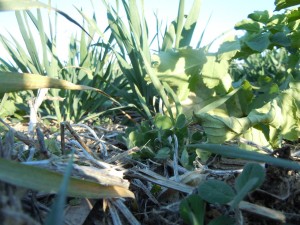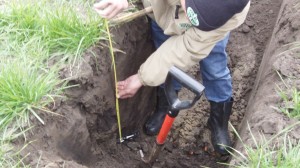As I take phone calls and conduct meetings I ask producers if they want to have the cover crop they are choosing to overwinter or die during the winter. I’d guess that the answer as split 50/50. The biggest reason for wanting the cover crop to die is that producers don’t want to have “to mess” with killing a crop in the spring of the year. Other advantages that folks mention is that they believe that the soil will be warmer if there is not a living cover in the field.


Advantages of having a “short-term summer/fall cover crop” is that you should still control the majority of the winter annual weeds, many legumes will still produce a good amount of nitrogen before winter (Austrian Winter Peas, Cowpeas, Crimson Clover, Berseem Clover, Field Peas, etc…). Radishes and turnips will do their nutrient scavenging and plow pan cracking work before the killing freeze too. Even annual ryegrass might have produced a pretty good root system before it goes winter dormant (or dies) depending on the seeding date/fall growth. (See details of what we found in an annual ryegrass field in the fall of 2010.)
So what would be the advantage of a winterhardy cover crop? Improved spring erosion control, more living roots in the soil for a longer time period, more spring-time earthworm activity, more nitrogen produced (from legumes) and over a longer time period, minimal soil temperature change (versus a dead cover crop or no cover), a longer grazing time period, to name a few.
Disadvantages of the crop overwintering would include the risk of a very wet spring causing trouble getting the crop killed, possibly cooler spring soil temperatures, and possibly some reasons that don’t come to mind.
If using a legume like clover it seems to be advantageous to have it overwinter, however Berseem clover possibly produces the most N of any legume…and it is sure to winterkill in Midwestern winters. And I like Berseem clover when it fits the producers situation.
So, does it matter if the cover crop survives the winter…even if it dies when you expected it to survive? My answer is that there are still benefits on most cover crops IF they were productive in the fall/winter. If you have a late planted cover crop that has minimal growth in the fall and then it dies…you possibly “wasted” money. Do your best to plant cover crops in a timely fashion. Give them the best opportunity to do their best!